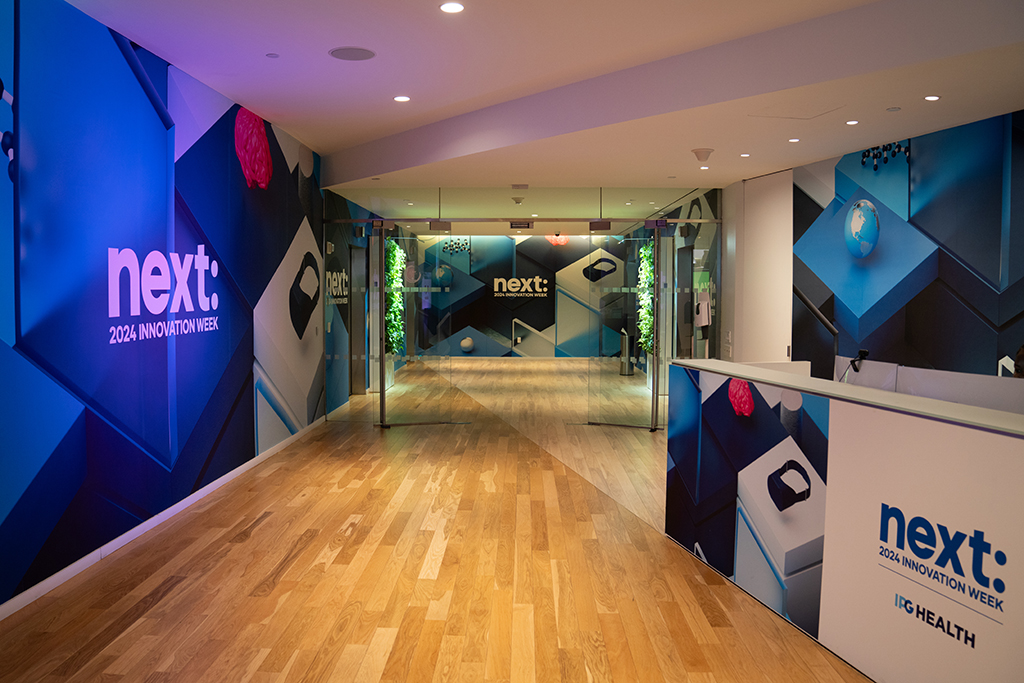In the world of healthcare marketing, AI, data and technology are paramount for engaging with audiences in meaningful ways. At IPG Health’s 8th annual Next: Innovation Week, trailblazers, influencers and entrepreneurs across the healthcare marketing industry gathered for three days to delve into real-world use cases and the transformative role that AI will continue to play, while also showcasing strategies to maximize impact and effectiveness for brands, and the future of emerging technologies and trends. Exclusively for IPG Health employees and clients, the event brought together thousands virtually and in-person from around the world to see industry innovators such as Meta, Microsoft, Adobe, TikTok and Veeva take center stage.
“This annual event is our continued and resounding commitment at IPG Health to innovation,” said Graham Johnson, chief production officer, IPG Health. “We are thrilled to be able to bring our employees and clients together again for real-time collaboration and ideating, with the goal of sparking inspiration for that next game changing idea for our clients’ brands.”
With topics such as data visualization, ambassador experiences, how technology is revolutionizing medical conferences to healthcare marketing trends and the power of patient and HCP social media influencers, the event was chock-full of inspiration and tangible, practical tactics for teams to be deploying now. The sessions also covered a wide range of content from physicians’ perspectives on AI in market research and advertising to climate innovation for public health.
IPG Health also showcased its proprietary data, AI and tech-enabled platforms for healthcare including genAI conversational interface, ADELe (AI-powered Data Exploration and Learning), which democratizes data access to all stakeholders involved in the brand-building process. For example, the platform is particularly useful for onboarding team members on a therapeutic category, assessing historical campaigns and developing innovative strategies, better preparing sales reps and consolidating information more efficiently.
And when it comes to delivering effective creative at speed and at scale, EPIC, IPG Health’s tech-enabled end-to-end data platform, transforms healthcare and audience data into actionable insights that fuel the network’s renowned creative output. By harnessing AI-powered strategic products and continuous measurement feedback loops in customer activation, EPIC ensures creative effectiveness and accountability in real time with the legal governance and compliance that health and pharma marketers require.
Innovation Week also highlighted virtual assistants and search agents, which are now being deployed to facilitate seamless, natural and fluid communication between pharma brands and stakeholders, including HCPs, patients, caregivers and field reps. Large language models help predict the next thing to say. These AI-powered tools feature multilingual support, embedded videos, escalation capabilities, AI detection and personas to enhance the quality of interactions and foster stronger relationships. One session also shared how conversational AI in particular has proven very helpful in providing personalized and immediate support for patients with rare diseases.
AI is not just about efficiency. It’s also a catalyst for creativity. One session honed in on how generative AI can take small ideas and transform them into fully fledged concepts quickly. By automating the busy work, AI allows creative professionals to iterate through ideas faster, producing better outputs with the available time and resources.
The Next: Tech Playground, a hands-on experience with the latest technologies from holograms to generative AI to the Apple Vision Pro, offered attendees an immersive journey into the realm of possibilities, where attendees witnessed firsthand how data, AI and technology are reshaping the healthcare landscape.
In addition, the event highlighted ways to deliver meaningful content solutions, leverage global production to drive impactful marketing campaigns and elevate omnichannel marketing through guided monitoring and sales science modeling. Technology, AI and data are helping to ensure healthcare is more accessible and equitable by detecting and silencing bias in health tech with EQL Band, for example, and ensuring the right patients get access to innovation, at the right time, for a fair price.
This year’s event was not just about embracing the future but embracing the here and now, too. There’s so much technology already at our fingertips that has the power to transform how brands create content, engage with patients and impact lives. The possibilities are endless.





